Marvin & Johnny were an American doo-wop duo that recorded in the 1950s. The duo comprised Marvin Phillips (born October 23, 1931) and Emory "Johnny" Perry (March 1, 1928 - January 6, 2011), who recorded the early doo-wop single, "Cherry Pie". [1]
Marvin & Johnny were an American doo-wop duo that recorded in the 1950s. The duo comprised Marvin Phillips (born October 23, 1931) and Emory "Johnny" Perry (March 1, 1928 - January 6, 2011), who recorded the early doo-wop single, "Cherry Pie". [1]
Phillips was born in Guthrie, Oklahoma, United States and Perry in Sherman, Texas, but their impact in the music industry occurred in Los Angeles in 1954. The pair had become acquainted in 1949 when they were saxophonists for The Richard Lewis Band. [1]
Prior to teaming up with Perry, Phillips worked with several other artists who performed under the name "Johnny." The first was Carl Green, and later Johnny Starks. Phillips also paired with the R&B singer Jesse Belvin. They charted with "Dream Girl" b/w "Daddy Loves Baby" in late 1952. [1] "Dream Girl" received good airplay and sales in California, but Belvin had opportunities elsewhere and left Phillips to pursue a solo career. Later, Marvin "Rip" Spencer, Phillips' nephew, would perform under the Marvin and Johnny names. [2]
Phillips then teamed up with Carl "Johnny" Green, who had been working as a duo recording as Johnny & Mack for Deluxe Records. This incarnation of the duo recorded "Baby Doll" b/w "I'm Not Your Fool" for Specialty Records in the summer of 1953. [1] At the same time, Phillips recorded the single "Sweetheart Darling" for Swingtime Records. The next outing for the duo was "Jo Jo" b/w "How Long She Been Gone" in early 1954. "School of Love" b/w "Boy Loves Girl" was their next release. On July 13, 1954, the pair signed with the Bihari brothers and moved to the Modern Records label. At Modern, they recorded "Tick Tock" and "Cherry Pie." [1] The record was a big seller, and both sides received airplay. [1] As was commonplace among early doo-wop, part of its popularity rested with the double-entendre lyric.[ citation needed ]
After "Cherry Pie", the pair performed on shows and revues that traveled around the West Coast of the United States. They released "Day In-Day Out" b/w "Flip", then "Kiss Me" b/w "Sugar," and "Little Honey" b/w "Honey Girl". None of these recordings had the commercial impact of "Cherry Pie."
Aside from their doo-wop lineage, Marvin & Johnny were significant figures in the transition from West Coast jump blues to R&B. In 1955, Marvin & Johnny continued to do personal appearances and recorded singles. However, their appeal continued to be based on "Cherry Pie." They went their separate ways that year, but Marvin did not let the Marvin & Johnny name die. Jesse Belvin had received his discharge from the U.S. Army by this time and he rejoined Phillips. In July 1956, Phillips and Belvin broke up again as Phillips began a solo career billed as Long Tall Marvin. Aladdin Records released "My Dear My Darling" in September 1956 and credited it to Marvin & Johnny. In May 1958, an old Marvin & Johnny recording of "Yak Yak" b/w "Pretty Eyes" was released on Aladdin.
George Carlin performed "Cherry Pie" following a monologue on the Gladys Knight & the Pips variety show in 1975, backed by the Pips, and again on The Arsenio Hall Show on 30 November 1989.
The Penguins were an American doo-wop group from Los Angeles, California, that were active during the 1950s and early 1960s. They are known for their 1954 hit song, "Earth Angel", which was one of the first rhythm and blues songs to cross over to the pop charts. The song would ultimately prove to be their only success. The song peaked at No. 8 on the US Billboard Best Sellers in Stores pop chart but had a three-week run at No. 1 on the R&B chart.

Doo-wop is a genre of rhythm and blues music that originated in African-American communities during the 1940s, mainly in the large cities of the United States, including New York, Philadelphia, Pittsburgh, Chicago, Baltimore, Newark, Detroit, Washington, D.C., and Los Angeles. It features vocal group harmony that carries an engaging melodic line to a simple beat with little or no instrumentation. Lyrics are simple, usually about love, sung by a lead vocal over background vocals, and often featuring, in the bridge, a melodramatically heartfelt recitative addressed to the beloved. Harmonic singing of nonsense syllables is a common characteristic of these songs. Gaining popularity in the 1950s, doo-wop was "artistically and commercially viable" until the early 1960s, but continued to influence performers in other genres.
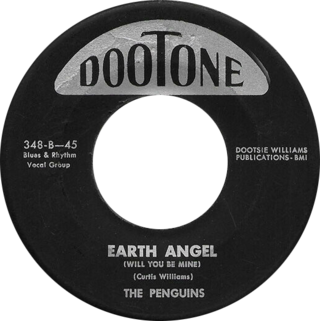
"Earth Angel", occasionally referred to as "Earth Angel (Will You Be Mine)", is a song by American doo-wop group the Penguins. Produced by Dootsie Williams, it was released as their debut single in October 1954 on Dootone Records. The Penguins had formed the year prior and recorded the song as a demo in a garage in South Central Los Angeles. The song's origins lie in multiple different sources, among them songs by Jesse Belvin, Patti Page, and the Hollywood Flames. Its authorship was the subject of a bitter legal dispute with Williams in the years following its release.
The Andantes were an American female session group for the Motown record label during the 1960s. Composed of Jackie Hicks, Marlene Barrow, and Louvain Demps, the group sang background vocals on numerous Motown recordings, including songs by Martha Reeves & the Vandellas, the Temptations, Stevie Wonder, the Four Tops, Jimmy Ruffin, Edwin Starr, the Supremes, the Marvelettes, Marvin Gaye and the Isley Brothers, among others. It is estimated they appeared on 20,000 recordings.
The Cadillacs were an American rock and roll and doo-wop group from Harlem, New York, active from 1953 to 1962. The group was noted for their 1955 hit "Speedoo", written by Esther Navarro, which was instrumental in attracting white audiences to black rock and roll performers.
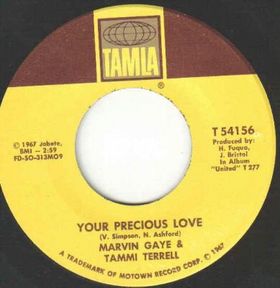
"Your Precious Love" is a popular song that was a 1967 hit for Motown singers Marvin Gaye and Tammi Terrell. The song was written by Nickolas Ashford and Valerie Simpson, and produced by Harvey Fuqua and Johnny Bristol. The doo-wop styled recording features background vocals by Fuqua, Gaye, Terrell and Bristol, and instrumentals by The Funk Brothers with the Detroit Symphony Orchestra. The song peaked at #5 on Billboard Pop Singles chart, #2 on Billboard's R&B Singles chart, and the top 40 on Billboard's Easy Listening survey. The song was later sampled by Gerald Levert on the song, "Your Smile", on his 2002 album, The G Spot.

Little Walter DeVenne was an American radio personality who was for many years based in Boston, Massachusetts, and in New Hampshire and was the host of the syndicated retro oldies program Little Walter's Time Machine focusing on the pop, doo-wop, blues, R&B and early rock n' roll hits of the 1950s and early to mid-1960s, presented in the high-energy style of the Top 40 AM radio stations of that era.
"Ko Ko Mo (I Love You So)" is a popular rock novelty song written in late 1954 by the rhythm and blues partnership of Forest Gene Wilson and Eunice Levy, and also credited to Jake Porter. One of the earliest rock and roll songs, it was probably "the most extensively recorded rock 'n' roll song of that time".
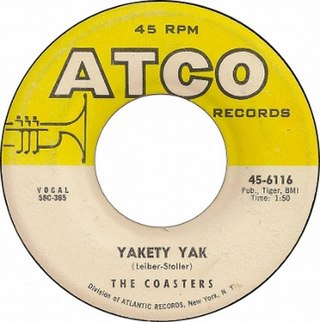
"Yakety Yak" is a song written, produced, and arranged by Jerry Leiber and Mike Stoller for the Coasters and released on Atco Records in 1958, spending seven weeks as #1 on the R&B charts and a week as number one on the Top 100 pop list. This song was one of a string of singles released by the Coasters between 1957 and 1959 that dominated the charts, making them one of the biggest performing acts of the rock and roll era.
"Goodnight My Love" is a popular song written by George Motola and John Marascalco in 1956.
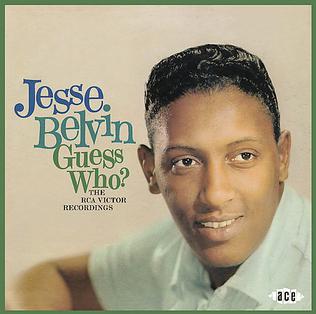
Jesse Lorenzo Belvin was an American singer, pianist and songwriter popular in the 1950s. Belvin co-wrote the 1954 Penguins' doo-wop classic "Earth Angel", which sold more than 10 million copies, while his top recording was the 1956 single "Goodnight My Love", a song that reached No. 7 on Billboard's R&B chart.
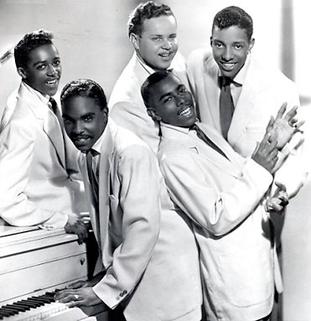
The Solitaires were an American doo-wop group, best known for their 1957 hit single "Walking Along". Although they never had a national chart hit, they were one of the most popular vocal groups in New York in the late 1950s.
Eugene Church was an American R&B singer and songwriter.
Parrot Records was an American Chicago-based record label, founded in 1952 by the disc jockey, Al Benson. It specialized in blues, jazz, doo-wop, and gospel. The company began operating in mid-1953, and lasted until mid-1956. Several Parrot recordings were later released by Chess Records. Parrot's sister label Blue Lake operated from 1954 to 1956. There were plans for another subsidiary, to be called Eagle, but these were scrapped.
Ronald David Bright was an American R&B and doo-wop singer of the 1950s, 1960s and 1970s. He was born in New York City.
"Cherry Pie" is a song written by Joe Josea and originally performed by Marvin & Johnny in 1954 as the B-side to their single "Tick Tock".

The Marquees were an American doo-wop group formed in Washington, D.C., United States, in 1957. Evolving from the former group the Rainbows, the Marquees included Marvin Gaye and backed musicians such as Bo Diddley and Billy Stewart. The group also recorded as the New Moonglows with singer Harvey Fuqua.
Frank Miller "Frankie" Ervin was an American R&B singer who recorded both solo and with vocal groups including Johnny Moore's Three Blazers and The Shields.
The Hollywood Saxons were a Los Angeles R&B group who recorded under various other names. They were well known on the LA R&B circuit. Their recording history ran from the late 1950s to the late 1960s. Their discography is complex due to the various names they recorded under and labels they recorded on.

Charles Williams Wright is an American singer, instrumentalist and songwriter. He has been a member of various doo wop groups in the late 1950s and early 1960s as well as a solo artist in his own right. He is also the former leader and writer of hits for the group, Watts 103rd Street Rhythm Band.